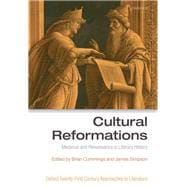The original essays in Oxford Twenty-First Century Approaches to Literature mean to provoke rather than reassure, to challenge rather than codify. Instead of summarizing existing knowledge scholars working in the field aim at opening fresh discussion. Instead of emphasizing settled consensus they direct their readers to areas of enlivened and unresolved debate.
The deepest periodic division in English literary history has been between the medieval and the early modern, not least because the cultural investments in maintaining that division are exceptionally powerful. Narratives of national and religious identity and freedom, of individual liberties, of the history of education and scholarship, of reading or the history of the book, of the very possibility of persuasive historical consciousness itself: each of these narratives (and more) is motivated by positing a powerful break around 1500.
None of the claims for a profound historical and cultural break at the turn of the fifteenth into the sixteenth centuries is negligible. The very habit of working within those periodic bounds (either medieval or early modern) tends, however, simultaneously to affirm and to ignore the rupture. It affirms the rupture by staying within standard periodic bounds, but it ignores it by never examining the rupture itself. The moment of profound change is either, for medievalists, just over an unexplored horizon; or, for early modernists, a zero point behind which more penetrating examination is unnecessary. That situation is now rapidly changing. Scholars are building bridges that link previously insular areas. Both periods are starting to look different in dialogue with each other.
The change underway has yet to find collected voices behind it. Cultural Reformations volume aims to provide those voices. It will give focus, authority, and drive to a new area.








